人教版(2019)选择性必修第三册Unit2 Bridging Cultures语法精讲课件(35张ppt)
文档属性
| 名称 | 人教版(2019)选择性必修第三册Unit2 Bridging Cultures语法精讲课件(35张ppt) |  | |
| 格式 | zip | ||
| 文件大小 | 1.1MB | ||
| 资源类型 | 教案 | ||
| 版本资源 | 人教版(2019) | ||
| 科目 | 英语 | ||
| 更新时间 | 2022-03-07 16:06:05 | ||
图片预览

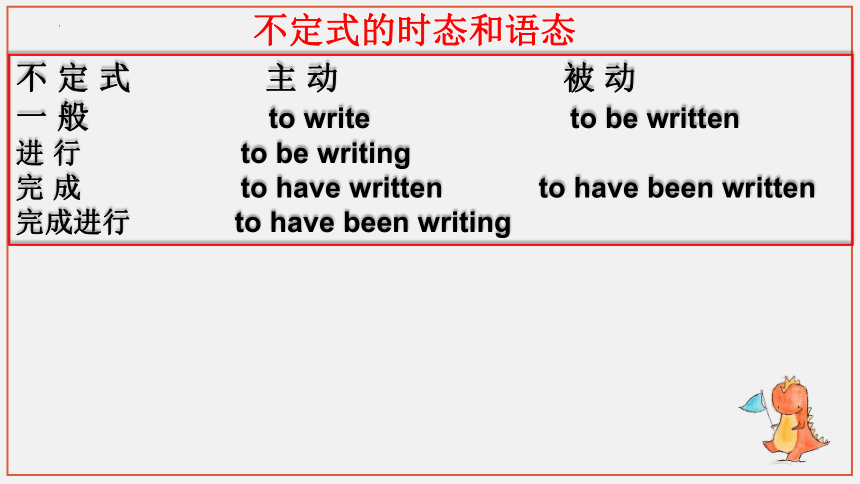
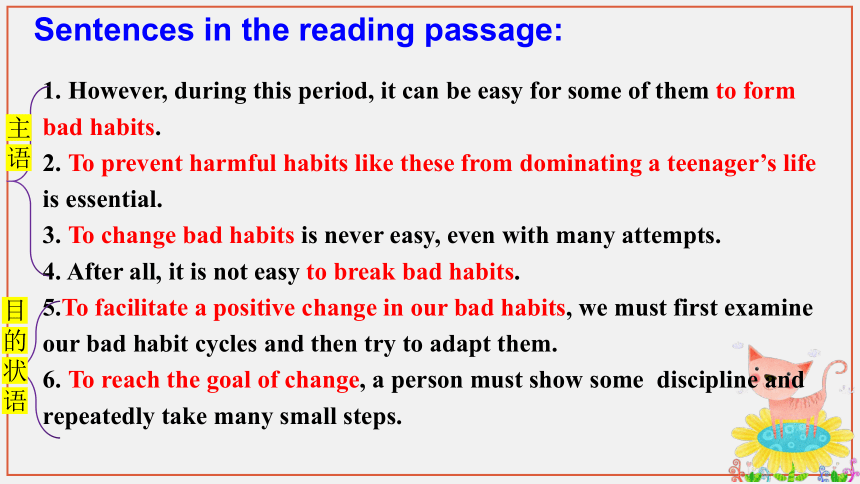
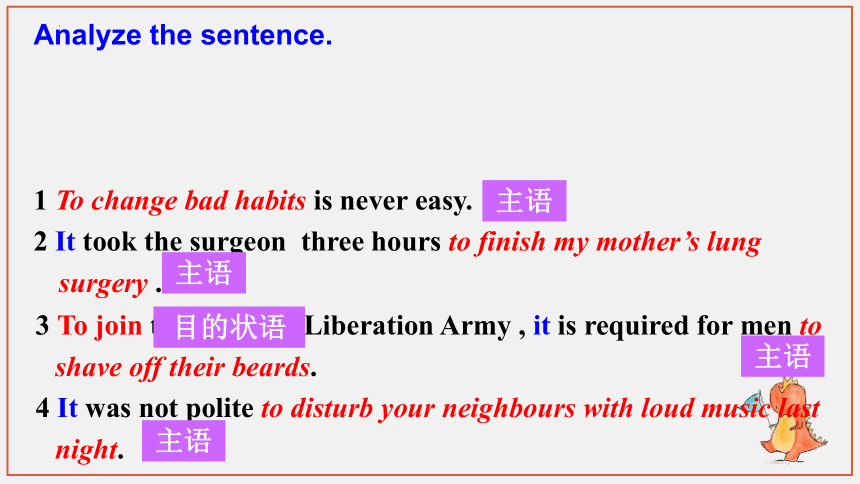



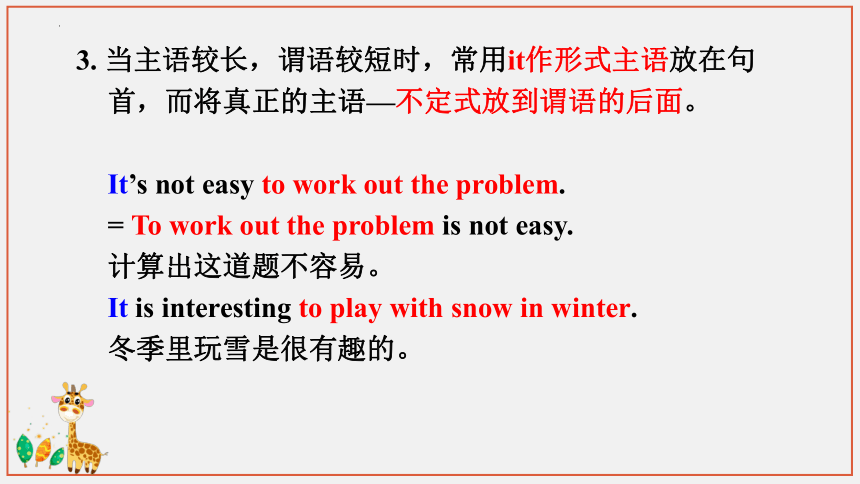
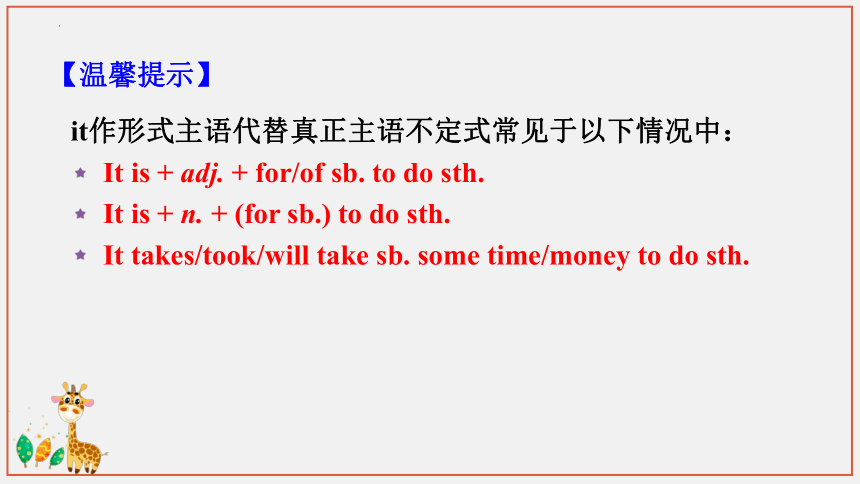
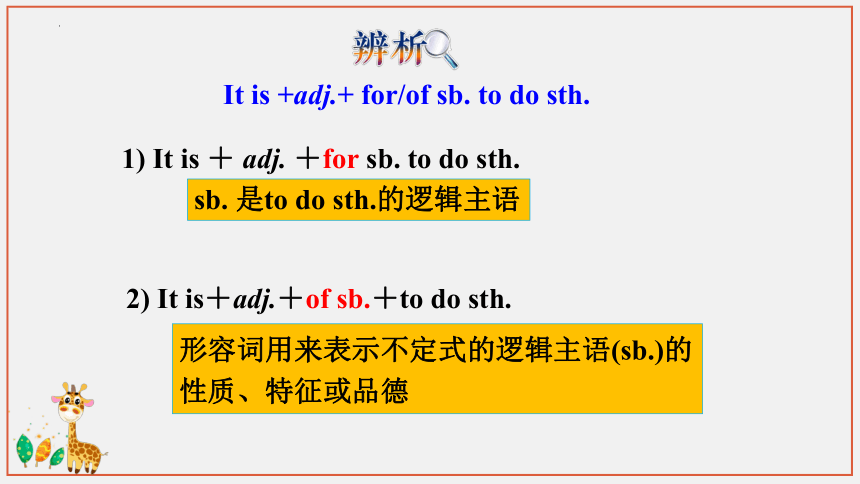

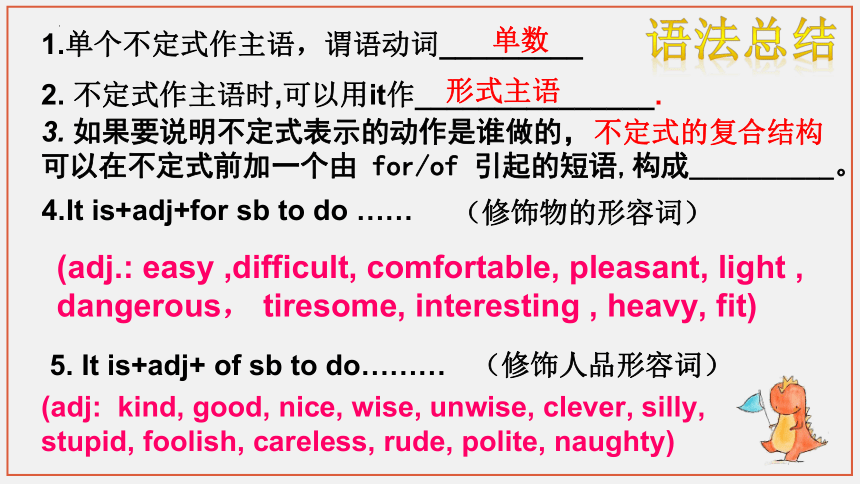
文档简介
(共35张PPT)
语法精讲
不定式
不定式的时态和语态
不 定 式 主 动 被 动
一 般 to write to be written
进 行 to be writing
完 成 to have written to have been written
完成进行 to have been writing
Sentences in the reading passage:
1. However, during this period, it can be easy for some of them to form bad habits.
2. To prevent harmful habits like these from dominating a teenager’s life is essential.
3. To change bad habits is never easy, even with many attempts.
4. After all, it is not easy to break bad habits.
5.To facilitate a positive change in our bad habits, we must first examine our bad habit cycles and then try to adapt them.
6. To reach the goal of change, a person must show some discipline and repeatedly take many small steps.
主语
目的状语
Analyze the sentence.
1 To change bad habits is never easy.
2 It took the surgeon three hours to finish my mother’s lung surgery .
主语
主语
3 To join the People’s Liberation Army , it is required for men to shave off their beards.
4 It was not polite to disturb your neighbours with loud music last night.
目的状语
主语
主语
考点突破
考点一 不定式作主语
动词不定式作主语常见的三种形式
1. 不定式作主语通常位于句首,表示具体的某次动作,谓语动词用单数。
To see is to believe.
百闻不如一见。
To learn a skill is very important for everyone in society.
学习一项技能对社会上的每个人都很重要。
2. 动词不定式与疑问词who, whom, whose, what, which, when, where, how等连用构成不定式短语,也可作主语。
How to use the computer is the question.
如何使用计算机是个问题。
Where to go has not been decided.
去哪儿还没有定下来。
3. 当主语较长,谓语较短时,常用it作形式主语放在句首,而将真正的主语—不定式放到谓语的后面。
It’s not easy to work out the problem.
= To work out the problem is not easy.
计算出这道题不容易。
It is interesting to play with snow in winter.
冬季里玩雪是很有趣的。
it作形式主语代替真正主语不定式常见于以下情况中:
It is + adj. + for/of sb. to do sth.
It is + n. + (for sb.) to do sth.
It takes/took/will take sb. some time/money to do sth.
【温馨提示】
1) It is + adj. +for sb. to do sth.
sb. 是to do sth.的逻辑主语
It is +adj.+ for/of sb. to do sth.
2) It is+adj.+of sb.+to do sth.
形容词用来表示不定式的逻辑主语(sb.)的性质、特征或品德
It is necessary for young students to learn a foreign language.
对年轻的学生来说,学习一门外语是必要的。
It was silly of you to give up such a good chance!
你放弃这么好的一个机会,真傻!
3. 如果要说明不定式表示的动作是谁做的,
可以在不定式前加一个由 for/of 引起的短语,构成__________。
2. 不定式作主语时,可以用it作_______________.
It is+adj+for sb to do ……
5. It is+adj+ of sb to do………
(adj: kind, good, nice, wise, unwise, clever, silly, stupid, foolish, careless, rude, polite, naughty)
(修饰人品形容词)
(修饰物的形容词)
1.单个不定式作主语,谓语动词_________
单数
形式主语
不定式的复合结构
语法总结
(adj.: easy ,difficult, comfortable, pleasant, light , dangerous, tiresome, interesting , heavy, fit)
考点突破
考点二 不定式作状语
二 不定式作状语
◆(2018·北京卷) During the Mid-Autumn Festival, family members often gather together to share a meal, admire the moon and enjoy moon cakes.
◆(四川卷)Tom took a taxi to the airport, only to find his plane high up in the sky.
◆(辽宁卷)This machine is very easy to operate. Anybody can learn to use it in a few minutes.
考点归纳( 不定式作状语)
1.作目的状语,
可用so as to/in order to替换,但so as to一般不可置于句首,意为“为了;想要”。
2.作结果状语,常用于下列结构中:
only to do(表示意想不到的结果);
enough to do(足够做……);
too...to do...(太……而不能……);
so/such...as to...(如此……以至于……)等。
3.作原因状语,
常用在“主语+系动词+形容词+to do”结构中。不
定式用以说明产生这种情绪的原因。这类形容词:happy, glad, sorry, anxious, angry, pleased, surprised, astonished, delighted, disappointed 等。
名师点津
“主语+be+形容词+不定式”结构,形容词表示主语的性质或特征,如: easy, difficult, hard, cheap, expensive, fit, comfortable, heavy, good, important, impossible, dangerous 等。
句子的主语和不定式构成逻辑上的动宾关系,且此时不定式通常用主动形式表示被动意义。
另外需注意的是在该结构中,不定式中的动词必须是及物动词,若为不及物动词,则要在其后加上适当的介词,使之构成及物动词短语。
The man is not easy to get along well with .
Offered
to save
(
)
考点突破
考点三 不定式作定语
一 不定式作定语
◆(安徽卷)The play to be produced next month aims mainly to reflect the local culture.
◆He is always the first to arrive at the school and the last to leave the school.
◆(辽宁卷)And the best way to strengthen willpower is to make it into a habit.
考点归纳(不定式作定语)
不定式作定语通常放在所修饰词之后,表示将来的动作。
2. 序数词,形容词最高级,the last, the only
等后或被这些词修饰的名词/代词后,常用不定式作定语。
3.被修饰词是抽象名词时,常用不定式作定语。
常见名词:ability, chance, idea, hope, wish, fact, excuse, promise, attempt, way 等。
名师点津
不定式作定语时,当句子的主语是不定式的逻辑主语时,不定式使用主动式;当句子的主语不是不定式的逻辑主语且不定式与所修饰的名词或代词之间是被动关系时,不定式使用被动式。
◆Have you got anything to buy
◆I want to go to Beijing. Do you have anything
to be bought
名师点津
不定式与其所修饰的词之间往往是动宾关系,若该不定式是不及物动词,其后应有必要的介词。
◆Suddenly a good idea occurred to her,
but she couldn’t find any paper to write on.
to catch
spent
saying
考点突破
考点四 非谓语动词作宾语
一 非谓语动词作宾 语
◆(江苏卷)The police officers decided to conduct a
thorough and comprehensive review of the case.
◆There is no doubt that the event will attract more
visitors to enjoy visiting this wonderful city.
◆(陕西卷)I still remember being taken to the Famen
Temple and what I saw there.
◆(重庆卷)The author begins his account of the tour
in the forest mainly by describing various sounds.
考点归纳 (非谓语 动词作宾语)
1.只接不定式作宾语的动词:
decide/determine, learn, want, expect/hope/wish;
refuse, manage, care, pretend ,offer, promise, choose,
plan;agree, ask/beg, help等
2.只接动名词作宾语的动词及短语:
consider, suggest/advise, look forward to,
excuse/pardon;admit, fancy avoid, miss,deny, finish,
enjoy/appreciate,forbid/avoid, imagine, risk;mind,
allow/permit, escape等
考点归纳 (非谓语 动词作宾 语)
3.接不定式与动名词作宾语意义不同的动词:
(1)try to do 尽力try doing 试着去做
(2)mean to do打算做;mean doing 意味着
(3)regret to do遗憾要去做regret doing后悔做过
(4)remember to do 记得去做remember doing记得做过
(5)forget to do忘记去做forget doing 忘记做了
4.动词作介词的宾语时,要用动名词形式,不能用动词不定式。
由“动词+介词”构成的短语,其后跟动名词作宾语,
常见的有:be/get used to(习惯于), feel like(想要), insist on(坚
持), get down to(开始认真做某事), devote...to...(致力于……),
object to(反对), stick to(坚持), give up(放弃),
have difficulty/trouble (in) doing sth,have fun (in) doing sth.等
名师点津
3.动词want, need, require作“需要”讲时,其后要用v. ing形式的主动形式或不定式的被动语态作宾语。与此用法相同的动词还有deserve(值得)。
4.当非谓语动词位于but, except后时,习惯上要用不定式。并且,当其前有实义动词do及相关形式时,则不定式要省略to;若其前没有动词do,则不定式通常带to。
◆We had no choice but to wait.
◆I could do nothing except/but agree.
名师点津
不定式短语作宾语时,如果还带有宾语补足语,往往把不定式短语放在宾语补足语之后,而用it作形式宾语,结构:
find/think/ believe/ consider + it +宾补 + to do
◆ I find it interesting to study history.
to eat
trying
to be discovered
trying
考点突破
考点五 非谓语动词作宾补
一 不定式作宾补
◆(山东卷)If we expect people to give up the habit of driving, we must give them an alternative they can rely on.
不定式作宾补时,宾语和不定式之间在逻辑上是主谓关系,不定式表将来、主动。常用不定式作宾补的动词(短语):advise, allow, ask, beg, cause, encourage, expect, forbid, force, intend, invite, order, persuade, prefer, require, remind, tell, want, warn, wish, call on, depend on等。
高考点津
◆(江西卷)He is thought to have acted foolishly. Now
he has no one but himself to blame for losing the job.
Sb/sth be said/believed/reported/considered
/thought+to do/to have done
(不定式用作主语补足语)
It be+ said/believed/reported/considered… +that
becoming
organized
(3) Tom is said ________________ (go) abroad last week.
have gone
谢谢观看
Unit 2
语法精讲
不定式
不定式的时态和语态
不 定 式 主 动 被 动
一 般 to write to be written
进 行 to be writing
完 成 to have written to have been written
完成进行 to have been writing
Sentences in the reading passage:
1. However, during this period, it can be easy for some of them to form bad habits.
2. To prevent harmful habits like these from dominating a teenager’s life is essential.
3. To change bad habits is never easy, even with many attempts.
4. After all, it is not easy to break bad habits.
5.To facilitate a positive change in our bad habits, we must first examine our bad habit cycles and then try to adapt them.
6. To reach the goal of change, a person must show some discipline and repeatedly take many small steps.
主语
目的状语
Analyze the sentence.
1 To change bad habits is never easy.
2 It took the surgeon three hours to finish my mother’s lung surgery .
主语
主语
3 To join the People’s Liberation Army , it is required for men to shave off their beards.
4 It was not polite to disturb your neighbours with loud music last night.
目的状语
主语
主语
考点突破
考点一 不定式作主语
动词不定式作主语常见的三种形式
1. 不定式作主语通常位于句首,表示具体的某次动作,谓语动词用单数。
To see is to believe.
百闻不如一见。
To learn a skill is very important for everyone in society.
学习一项技能对社会上的每个人都很重要。
2. 动词不定式与疑问词who, whom, whose, what, which, when, where, how等连用构成不定式短语,也可作主语。
How to use the computer is the question.
如何使用计算机是个问题。
Where to go has not been decided.
去哪儿还没有定下来。
3. 当主语较长,谓语较短时,常用it作形式主语放在句首,而将真正的主语—不定式放到谓语的后面。
It’s not easy to work out the problem.
= To work out the problem is not easy.
计算出这道题不容易。
It is interesting to play with snow in winter.
冬季里玩雪是很有趣的。
it作形式主语代替真正主语不定式常见于以下情况中:
It is + adj. + for/of sb. to do sth.
It is + n. + (for sb.) to do sth.
It takes/took/will take sb. some time/money to do sth.
【温馨提示】
1) It is + adj. +for sb. to do sth.
sb. 是to do sth.的逻辑主语
It is +adj.+ for/of sb. to do sth.
2) It is+adj.+of sb.+to do sth.
形容词用来表示不定式的逻辑主语(sb.)的性质、特征或品德
It is necessary for young students to learn a foreign language.
对年轻的学生来说,学习一门外语是必要的。
It was silly of you to give up such a good chance!
你放弃这么好的一个机会,真傻!
3. 如果要说明不定式表示的动作是谁做的,
可以在不定式前加一个由 for/of 引起的短语,构成__________。
2. 不定式作主语时,可以用it作_______________.
It is+adj+for sb to do ……
5. It is+adj+ of sb to do………
(adj: kind, good, nice, wise, unwise, clever, silly, stupid, foolish, careless, rude, polite, naughty)
(修饰人品形容词)
(修饰物的形容词)
1.单个不定式作主语,谓语动词_________
单数
形式主语
不定式的复合结构
语法总结
(adj.: easy ,difficult, comfortable, pleasant, light , dangerous, tiresome, interesting , heavy, fit)
考点突破
考点二 不定式作状语
二 不定式作状语
◆(2018·北京卷) During the Mid-Autumn Festival, family members often gather together to share a meal, admire the moon and enjoy moon cakes.
◆(四川卷)Tom took a taxi to the airport, only to find his plane high up in the sky.
◆(辽宁卷)This machine is very easy to operate. Anybody can learn to use it in a few minutes.
考点归纳( 不定式作状语)
1.作目的状语,
可用so as to/in order to替换,但so as to一般不可置于句首,意为“为了;想要”。
2.作结果状语,常用于下列结构中:
only to do(表示意想不到的结果);
enough to do(足够做……);
too...to do...(太……而不能……);
so/such...as to...(如此……以至于……)等。
3.作原因状语,
常用在“主语+系动词+形容词+to do”结构中。不
定式用以说明产生这种情绪的原因。这类形容词:happy, glad, sorry, anxious, angry, pleased, surprised, astonished, delighted, disappointed 等。
名师点津
“主语+be+形容词+不定式”结构,形容词表示主语的性质或特征,如: easy, difficult, hard, cheap, expensive, fit, comfortable, heavy, good, important, impossible, dangerous 等。
句子的主语和不定式构成逻辑上的动宾关系,且此时不定式通常用主动形式表示被动意义。
另外需注意的是在该结构中,不定式中的动词必须是及物动词,若为不及物动词,则要在其后加上适当的介词,使之构成及物动词短语。
The man is not easy to get along well with .
Offered
to save
(
)
考点突破
考点三 不定式作定语
一 不定式作定语
◆(安徽卷)The play to be produced next month aims mainly to reflect the local culture.
◆He is always the first to arrive at the school and the last to leave the school.
◆(辽宁卷)And the best way to strengthen willpower is to make it into a habit.
考点归纳(不定式作定语)
不定式作定语通常放在所修饰词之后,表示将来的动作。
2. 序数词,形容词最高级,the last, the only
等后或被这些词修饰的名词/代词后,常用不定式作定语。
3.被修饰词是抽象名词时,常用不定式作定语。
常见名词:ability, chance, idea, hope, wish, fact, excuse, promise, attempt, way 等。
名师点津
不定式作定语时,当句子的主语是不定式的逻辑主语时,不定式使用主动式;当句子的主语不是不定式的逻辑主语且不定式与所修饰的名词或代词之间是被动关系时,不定式使用被动式。
◆Have you got anything to buy
◆I want to go to Beijing. Do you have anything
to be bought
名师点津
不定式与其所修饰的词之间往往是动宾关系,若该不定式是不及物动词,其后应有必要的介词。
◆Suddenly a good idea occurred to her,
but she couldn’t find any paper to write on.
to catch
spent
saying
考点突破
考点四 非谓语动词作宾语
一 非谓语动词作宾 语
◆(江苏卷)The police officers decided to conduct a
thorough and comprehensive review of the case.
◆There is no doubt that the event will attract more
visitors to enjoy visiting this wonderful city.
◆(陕西卷)I still remember being taken to the Famen
Temple and what I saw there.
◆(重庆卷)The author begins his account of the tour
in the forest mainly by describing various sounds.
考点归纳 (非谓语 动词作宾语)
1.只接不定式作宾语的动词:
decide/determine, learn, want, expect/hope/wish;
refuse, manage, care, pretend ,offer, promise, choose,
plan;agree, ask/beg, help等
2.只接动名词作宾语的动词及短语:
consider, suggest/advise, look forward to,
excuse/pardon;admit, fancy avoid, miss,deny, finish,
enjoy/appreciate,forbid/avoid, imagine, risk;mind,
allow/permit, escape等
考点归纳 (非谓语 动词作宾 语)
3.接不定式与动名词作宾语意义不同的动词:
(1)try to do 尽力try doing 试着去做
(2)mean to do打算做;mean doing 意味着
(3)regret to do遗憾要去做regret doing后悔做过
(4)remember to do 记得去做remember doing记得做过
(5)forget to do忘记去做forget doing 忘记做了
4.动词作介词的宾语时,要用动名词形式,不能用动词不定式。
由“动词+介词”构成的短语,其后跟动名词作宾语,
常见的有:be/get used to(习惯于), feel like(想要), insist on(坚
持), get down to(开始认真做某事), devote...to...(致力于……),
object to(反对), stick to(坚持), give up(放弃),
have difficulty/trouble (in) doing sth,have fun (in) doing sth.等
名师点津
3.动词want, need, require作“需要”讲时,其后要用v. ing形式的主动形式或不定式的被动语态作宾语。与此用法相同的动词还有deserve(值得)。
4.当非谓语动词位于but, except后时,习惯上要用不定式。并且,当其前有实义动词do及相关形式时,则不定式要省略to;若其前没有动词do,则不定式通常带to。
◆We had no choice but to wait.
◆I could do nothing except/but agree.
名师点津
不定式短语作宾语时,如果还带有宾语补足语,往往把不定式短语放在宾语补足语之后,而用it作形式宾语,结构:
find/think/ believe/ consider + it +宾补 + to do
◆ I find it interesting to study history.
to eat
trying
to be discovered
trying
考点突破
考点五 非谓语动词作宾补
一 不定式作宾补
◆(山东卷)If we expect people to give up the habit of driving, we must give them an alternative they can rely on.
不定式作宾补时,宾语和不定式之间在逻辑上是主谓关系,不定式表将来、主动。常用不定式作宾补的动词(短语):advise, allow, ask, beg, cause, encourage, expect, forbid, force, intend, invite, order, persuade, prefer, require, remind, tell, want, warn, wish, call on, depend on等。
高考点津
◆(江西卷)He is thought to have acted foolishly. Now
he has no one but himself to blame for losing the job.
Sb/sth be said/believed/reported/considered
/thought+to do/to have done
(不定式用作主语补足语)
It be+ said/believed/reported/considered… +that
becoming
organized
(3) Tom is said ________________ (go) abroad last week.
have gone
谢谢观看
Unit 2
